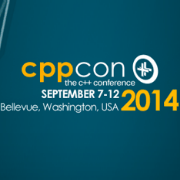 The CppCon 2014 conference program has been posted for the upcoming September conference. We've received requests that the program continue to be posted in "bite-sized" posts, a few sessions at a time, to make the 100+ sessions easier to absorb, so here is another set of talks. This series of posts will conclude once the entire conference program has been posted in this way.
The CppCon 2014 conference program has been posted for the upcoming September conference. We've received requests that the program continue to be posted in "bite-sized" posts, a few sessions at a time, to make the 100+ sessions easier to absorb, so here is another set of talks. This series of posts will conclude once the entire conference program has been posted in this way.
There is lots -- lots -- of existing C++ code. How can you effectively bring existing C++ code forward to C++11/14? How can you upgrade your coding styles and conventions? The following CppCon 2014 talks tackle these issues and more.
In this post:
- Adventures in Updating a Legacy Codebase
- Elevate Your Code to Modern C++11 with Automated Tooling
- An Overview of C++11/14
Adventures in Updating a Legacy Codebase
Still maintaining a legacy application? Do you have strdup()'s crying to be replaced with std::string? Do pre-standard headers such as iostream.h litter your code? Do boost libraries no longer compile with your favorite C++98 compiler? From GUIs to kernel drivers, this talk will look at some of the adventures taken while updating a codebase with more than 20 years of history to C++11.
Speaker: Billy Baker, Senior Staff Engineer, FlightSafety International. Billy Baker has developed deterministic real-time flight simulation software using C++ for FlightSafety International, Evans and Sutherland and Boeing since 1997. At C++ committee meetings, he can most likely be found in LWG. He received his B.S. and M.S in Applied Mathematics from the University of Tulsa and is currently working on a Ph.D. in Computer Science. If asked, he will tell stories from his research semester at NCSA when web browsers did not yet have forms support.
Elevate Your Code to Modern C++11 with Automated Tooling
This talk will motivate and demonstrate how to transform your existing C++ code into more modern style and better quality. A key to that is refactoring the code into better shape. While manual refactoring can be tedious and error prone the author demonstrates automated refactoring that was created by his students and assistants and himself over the last nine years on the basis of Eclipse CDT. The tooling works with all compilers, because it is independent of one.
For example, we will show how to eliminate unnecessary macros or replace them by type-safe C++11/14 alternative code automatically. Or, to replace pointers, plain arrays and manual memory management by references, smart pointers, std::string, std::array, or std::vector automatically. Also other transformations, such as introducing a template parameter to reduce a coupling to a single concrete type are demonstrated. All with the goal to modernize and hopefully simplify your C++ code. Even if you are not deeply interested in modernizing your code base, some helpful tooling, such as toggling function definitions into a single place, to change their signature, can be of great help. On the other hand, many of the proposed improvements can also be applied with your favorite code editor only more tediously.
Speaker: Peter Sommerlad, Professor, Director IFS, FHO HSR Rapperswil -- IFS Institute for Software. Prof. Peter Sommerlad is head of IFS Institute for Software at FHO HSR Rapperswil. Peter is co-author of the books POSA Vol.1 and Security Patterns. His goal is to make software simpler by Decremental Development: Refactoring software down to 10% its size with better architecture, testability and quality and functionality. Peter is a member of the C++ standardization committee, ACCU, ACM, SI and president of SWEN.Website: http://wiki.hsr.ch/PeterSommerladTwitter handle: @PeterSommerlad
An Overview of C++11/14
This accelerated introduction to C++11/C++14 surveys most of the key additions to the C++ language, including support for 1) increased code clarity (lambdas, uniform initialization, auto, new OOD control), 2) improved performance (rvalue references and move constructors), 3) multithreading (concurrency and atomic types).
The presentation is designed for those who truly need a quick overview of the new C++, so the focus is on breadth rather than depth. Whenever feasible, new language features are presented in a style showcasing how they improve over their "Old C++" counterparts.
Speaker: Leor Zolman, BD Software. Leor Zolman has been involved in system software/compiler development, system administration, application development, and education for 40 years, spanning the CP/M, UNIX, and Windows operating systems. Leor is the author of The BD Software C Compiler (“BDS C”, 1979), the first native-code C compiler targeted exclusively for personal computers. In the early 90’s, Leor was a member of the technical staff of R&D Publications, where he wrote columns for R&D’s magazines: The C/C++ Users Journal, Windows Developer’s Journal, and SysAdmin, and he also authored the first book ever published by R&D Books: Illustrated C. More recently, in addition to designing and delivering on-site training courses on C, C++, Java, Perl, and Unix, Leor wrote STLFilt: An STL Error Message Decryptor for C++, a Freeware tool for simplification of complex (i.e., unreadable) template-related C++ error diagnostics. When not engaged in learning or teaching C++, you may find Leor administering and participating in several financial discussions boards, riding his BMW R1200RT, playing tennis or showing people the Ring Nebula through his LX200GPS telescope at star parties around the North Shore Boston area.

Add a Comment
Comments are closed.